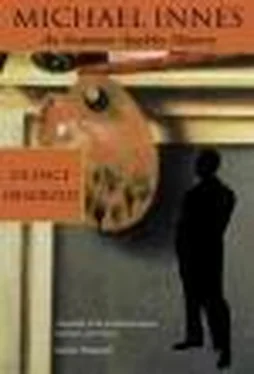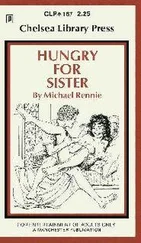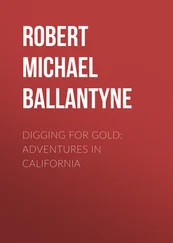Michael Innes - Lament for a Maker
Здесь есть возможность читать онлайн «Michael Innes - Lament for a Maker» весь текст электронной книги совершенно бесплатно (целиком полную версию без сокращений). В некоторых случаях можно слушать аудио, скачать через торрент в формате fb2 и присутствует краткое содержание. Жанр: Старинная литература, на английском языке. Описание произведения, (предисловие) а так же отзывы посетителей доступны на портале библиотеки ЛибКат.
- Название:Lament for a Maker
- Автор:
- Жанр:
- Год:неизвестен
- ISBN:нет данных
- Рейтинг книги:4 / 5. Голосов: 1
-
Избранное:Добавить в избранное
- Отзывы:
-
Ваша оценка:
- 80
- 1
- 2
- 3
- 4
- 5
Lament for a Maker: краткое содержание, описание и аннотация
Предлагаем к чтению аннотацию, описание, краткое содержание или предисловие (зависит от того, что написал сам автор книги «Lament for a Maker»). Если вы не нашли необходимую информацию о книге — напишите в комментариях, мы постараемся отыскать её.
Lament for a Maker — читать онлайн бесплатно полную книгу (весь текст) целиком
Ниже представлен текст книги, разбитый по страницам. Система сохранения места последней прочитанной страницы, позволяет с удобством читать онлайн бесплатно книгу «Lament for a Maker», без необходимости каждый раз заново искать на чём Вы остановились. Поставьте закладку, и сможете в любой момент перейти на страницу, на которой закончили чтение.
Интервал:
Закладка:
On forse I man his nyxt pray be;
Timor Mortis conturbat me.’
And at that she came and sat down beside me, sudden as heavy-thoughted as before. ‘Dunbar’s Lament for the Makers , that he made when he knew another poet, and that himself, was going to die. Uncle often chants it now, and no doubt Isa heard him.’
I remembered then Isa had said Guthrie’s verses seemed to have a run of Scottish names to them and then a bit of foreign stite forbye. So Dunbar’s poem it must have been, and the names Kennedy and Henderson she’d thought to hear through her swoon were no more than echoes from the poem again. And fine I could have solved the mystery myself and without Christine joking at me about Chaucer had I only had the wit to think, for Dunbar’s poems have been familiar to me long enough, and stand on my shelf indeed in the right learned and elegant edition of Dr Small.
And that was the end of my talk with Christine that day, for syne she looked at the clock and picked up her bonnet and was away through the snow that briskly that I guessed Neil Lindsay was somewhere at the end of her journey. Rambling and inconclusive the talk had been; I had an uncanny feeling at the last of having been left groping for I didn’t know what in the shadowy rooms and crumbling corridors of Castle Erchany. That evening I sat by my bench long into the gloaming, never thinking to put up the shutters and take a dander to the Arms; the thing was working on me and I wanted solitude.
Strange that young Neil Lindsay, looking to break from the traditions of his folk and make a new life in a new land, should concern himself with the old bitterness of the Lindsays against the Guthries. And stranger that Guthrie, a scholar and once a poet, whose meditations must be of time and change and the nature of things, should have any thought for that past and narrow hate against the Lindsays. For if the latterday Lindsays, common folk and poor, might maybe take Ranald Guthrie as a type of those that have all and in taking more have beggared the simple folk of Scotland, and but add to that real resentment the colour of a long-past history, what was that to Guthrie – a rich man in the security of his possessions, that should never heed or mind the common envy of the poor? Was the laird doing more than treat Neil Lindsay’s suit as any man, proud of his lineage and his lands, would treat the suit of a crofter billy to one that lived as a daughter in his house?
But Christine thought her uncle was mad or maddened; and unco it was I should be right troubled by her thinking what near all Kinkeig had long thought. The thing was that Kinkeig was ever prepared to think and say any stite that had a spice to it, whereas Christine was a level lass and douce, and one that had learnt from Mistress Menzies and Guthrie to use words exactly. She meant what she said of the laird, and that her feeling was something she could scarce give convincing reason for didn’t make it trouble my mind the less.
Sudden it came to me I hadn’t asked her if she knew of any word lately from the American Guthries: might they not be worrying the laird after all – and the cool quean that had come that night to the Arms one of them? For it was clear that if Guthrie’s conduct these past months was to be accounted for there was more required than the matter of Christine and her Neil Lindsay. The parting with the Gamleys, the orders from Edinburgh, all that Isa Murdoch had seen and heard at the opening up of the meikle house and in the gallery: these seemed to be happenings before Guthrie had learnt who it was would be courting Christine, or that any was courting her. And I thought of the medical books the laird was pouring over, and of how he had fallen to beguiling himself with wee puzzles carven out of wood. And I thought of him cleaving his way in a fury into his long-deserted gallery, and of how he had wandered there, and of his standing at Isa’s last keek at him staring out over Loch Cailie. And ever Christine’s voice came back to me, hard as if she were facing deadly danger, saying her uncle was mad. And then, searching for the pattern that must be in all this, I seemed to hear the voice of the laird himself, crying out in the Latin refrain of that old Scottish poet that he was harried by the fear of death – nay, of Death himself.
At that I went ben and found the book and blew the dust from it and turned to the poem.
Lament for the Makaris
Quhen he was seik
I that in heill wes and glaidnes,
Am trublit now with gret seiknes,
And feblit with infirmitie;
Timor Mortis conturbat me…
And I read through that hundred-line lament for the dead poets of Scotland to the end:
Sen for the deth remeid is non,
Best is that we for deth dispone
Eftir our deth that lif may we;
Timor Mortis conturbat me.
11
It was a hard winter. Looking back on this prologue to what befell at Erchany I see the figures of it whiles driven helpless before the great storm that caught the schoolmistress, whiles sharp-etched on the memory in gestures as extravagant as the leafless star-hung trees showed in the long nights of black frost; and ever the fatal hurrying story of them punctuated by the falling and melting curtain of the snows. When the Thoughtful Citizen got his papers through the drifts – which he didn’t always – he would come ploutering down to the Arms and tell us the Fleet Street chiels had said things were right hard in Scotland, there were tremendous snows, and the season was a record just as he’d said. It was the stationy himself was a record, Will Saunders put in – a right cracked one and would to God he’d run out of needles or break a spring.
The very day Christine visited me it was that the leaden skies opened above the ready snow-covered braes and the fine flakes fell and fell, the glen and all the rolling parks thicker and thicker mantled, as pure and silent and still as the marble floor of heaven before the Almighty thought to create the Angelic host. Often in those days, days that went flitting by towards Christmas as white and quiet as stainless ghosts, I would wonder what was happening up the glen. I scarcely expected news; none could get through that deepening barrier unless it might be Tammas, who took an unnatural strength to himself with the coming of the snow, folk said, like as if he were a creature in a fairy-tale. Many is the mile of deep snow I’ve struggled through myself as a lad, when every week, winter and summer, I’d tramp to my bit reading in the Dunwinnie Institute. But I doubted if I’d ever made such a journey as now lay between Kinkeig and Erchany, and I was right surprised when, in fact, Tammas did come through.
As dead beat he was as Satan after he’d fought his way through Chaos – and, indeed, he was like a visitor from another world. There had been a car or two struggle through from Dunwinnie on the previous day – the twenty-second December – with news of great doings there at the tail of the Loch: curlers coming by the hundred, ’twas said, in special trains. But on the twenty-third nothing came and we doubted if anything more could come; Kinkeig was cut off from the world, and Erchany from Kinkeig again. All except for Tammas, hoasting and gasping on my doorstep, the breath steaming from the great slavering mouth of him like a dragon.
But a dragon would have had more sense than was left in the daftie after his trudge. What he said was a mere yammering there was nothing to be made of, he never heeded my invitation to come in but thrust a bit letter at me and was louping away down the road before I could speak again. I looked at the letter and it was from Christine: at that I never heeded more about the daftie but took it straight ben and read it by the fire.
Uncle Ewan Bell – I was a little fool with my fancies: will you forgive me? It is all right – I am sure it is all right, though strange – and I have only to wait till Christmas Day!
Читать дальшеИнтервал:
Закладка:
Похожие книги на «Lament for a Maker»
Представляем Вашему вниманию похожие книги на «Lament for a Maker» списком для выбора. Мы отобрали схожую по названию и смыслу литературу в надежде предоставить читателям больше вариантов отыскать новые, интересные, ещё непрочитанные произведения.
Обсуждение, отзывы о книге «Lament for a Maker» и просто собственные мнения читателей. Оставьте ваши комментарии, напишите, что Вы думаете о произведении, его смысле или главных героях. Укажите что конкретно понравилось, а что нет, и почему Вы так считаете.











